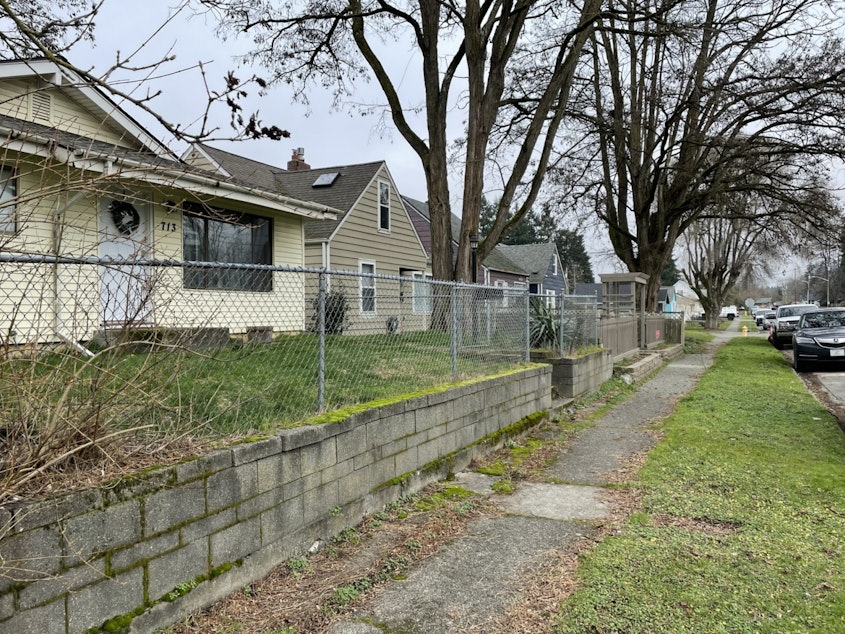'Forbidden housing' or 'speakeasy housing?': Today So Far

- A tour through "missing middle" housing as Washington state lawmakers consider how to fill the region's housing gap.
- How much power should Gov. Insee have? And for how long?
- Japanese Americans remember the legacy of "camp."
This post originally appeared in KUOW's Today So Far newsletter for Feb. 1, 2022.
Some call it "forbidden," others call it the "missing middle." Personally, I've called it "speakeasy housing." Because, and I want to speak easy about this, some places I've lived may not technically have been allowed under local regulations. They were totally set up to be lived in, however on paper, a few required boxes may have been left unchecked. But I was grateful nonetheless (I don't know how I would live in the city otherwise). As are others I've met in the area who have a roof over their head in the form of ADUs (in-law apartments, basement units, etc.). It's a way to afford living in our region. But shhh ... don't tell city officials.
The issue of Washington's "missing middle" housing somewhat touches upon this affordable gray area. It spans everything from zoning to filling in a pretty wide housing gap.
KUOW's Joshua McNichols recently took a tour through this issue — literally. Actually, he took two tours, including "The Forbidden Houses of Bothell," and another in Auburn with the city's mayor. In Bothell, people are advocating for more duplexes, triplexes, and other types of units that can easily house more people in highly-desired places to live. The mayor of Auburn, however, argues that not all housing can be placed just anywhere in town. These are two opposing voices as lawmakers in Olympia attempt to open up more communities to diversified housing options, beyond placing single family homes here, and giant apartments there.
Caught in the middle of these opposing arguments are people, like the Mackay family who spoke with Joshua. They house multiple generations at their Bothell duplex. And they'd like to accommodate more by adding a backyard cottage. But ... remember those city regulations I mentioned before? Check out the full details on this issue of housing types and affordability here.
How much power should a governor have? We are nearing the two-year anniversary of when Washington Gov. Jay Inslee declared a state of emergency for the Covid-19 pandemic. And unlike other such declarations, we've stayed under this state for quite a long time. There's no time limit to these emergency powers, which have allowed Inslee to implement stay-at-home orders and a vaccine mandate.
Sponsored
The issue is attracting a lot of voices, and not just those of Republicans who have long chided the governor for his use of emergency power. Democrats now have a bill that would set some parameters on the governor's emergency authority, such as providing the House and Senate the ability to terminate a state of emergency after 90 days. Another voice is the head of Washington's National Guard who argues that the bill up for consideration could put "federal money at risk and recent disasters have shown that there’s a lot of money on the line." Read more here.
It was 80 years ago this month that President Franklin Roosevelt signed the order that led to the internment of Japanese American families during WWII. At 84, Kenji Ima remembers when his family was removed from their Seattle home and sent to an internment camp. He was 4 years old at the time. His earliest memories of life in America are of barbed wire and soldiers with machine guns. It's those memories that he relates to his family today. Read his story here.
Have a comment or want to reach out to me? Send me an email at dyer@kuow.org.
AS SEEN ON KUOW

Sponsored
A burrowing owl being weighed and tagged at the Umatilla Weapons Depot in northern Oregon. The decommissioned military base provides sanctuary for the recovering burrowing owl population. Hear more on the return of The Wild Podcast. (Brenda Phillips)
DID YOU KNOW?
It's here! Lunar New Year is today. Welcome to the Year of the Tiger.
I previously noted in this newsletter that Lunar New Year, as its name implies, follows a lunar calendar, not the Gregorian calendar that we generally use. And every year is represented by a different animal — set to a 12 year cycle. You may be familiar with this as the Chinese zodiac, or recall those super fun charts at Chinese restaurants. A person can be associated with the animal of the year they are born, and that is said to imply certain attributes. For example, rabbits are calm and reasonable; roosters are hard working and modest.
We are at the start of the Year of the Tiger. Tigers have courage and are generous. They have sense of justice. They're also ambitious and enthusiastic. Tigers you may have heard of include: Lady Gaga, Leonardo DeCaprio, Anthony Kiedis, Paula Abdul, Wesley Snipes, Jon Bon Jovi, and Drake.
Sponsored
ALSO ON OUR MIND

Starbucks union push spreads to 54 stores in 19 states
Employees at 54 Starbucks stores in 19 states are pursuing union elections. Fifteen of those stores joined the union drive on Monday, petitioning the federal labor officials to set a vote. The filing coincides with the start of contract negotiations between Starbucks and unionized workers in Buffalo. Read more here.

